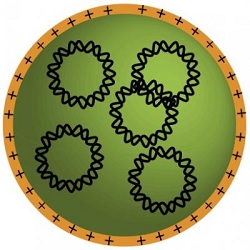 |
| DNA encapsulated within a biodegradable nanovehicle--Courtesy of Stephany Tzeng |
Johns Hopkins researchers published a study showing they can use biodegradable nanoparticles to carry DNA to brain cancer cells. The animal study suggests that these vehicles could deliver what they call "death genes" to the cells, treating the cancer while preserving healthy brain cells in the process.
In a study published in the journal ACS Nano, biomedical engineers and neurosurgeons joined forces to create vehicles that could be used to deliver cancer-killing genetic messages to glioblastomas, a particularly aggressive brain tumor. They formed nanoparticles made of biodegradable plastic and tested their penetration using fluorescence. Ultimately, when injected into mouse brains, the particles collected in tumor cells while leaving healthy cells, for the most part, alone.
These vehicles can then be loaded with DNA designed to turn "on" the genetic component of a cancer cell that signals for apoptosis, or cell death.
"In our experiments, our nanoparticles successfully delivered a test gene to brain cancer cells in mice, where it was then turned on," lead author Jordan Green said in a statement. "We now have evidence that these tiny Trojan horses will also be able to carry genes that selectively induce death in cancer cells, while leaving healthy cells healthy."
This study hearkens back to another one in which the same team sought to deliver small interfering RNA to brain cancer cells, encapsulating them in vehicles of their own, which have very different requirements as the siRNA is smaller and stiffer and works outside the cell nucleus. Similarly, these particles were much more effective in cancer cells than in healthy ones.
"Combining what we've learned in these two studies, we might even be able to design particles that can deliver DNA and siRNA at the same time," Green said. "That would allow us to fine tune the genetic self-destruct code that our particles deliver so that cancer cells die and healthy cells do not."
- here's the release
- and here's the April ACS Nano abstract
- and the earlier study